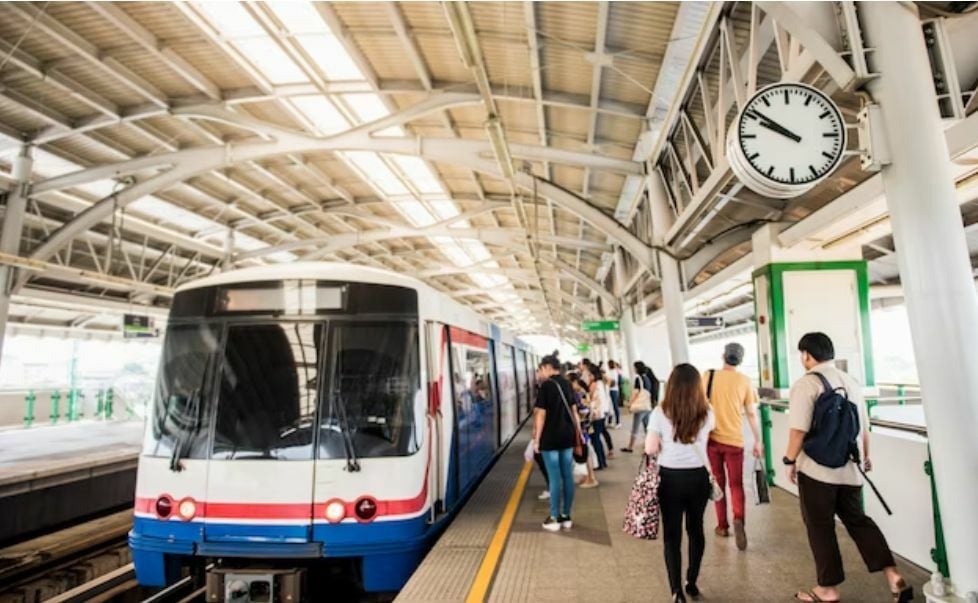Retiring in Thailand 2024: What you must know

Are you considering a retirement in a beautiful, tropical paradise with a low cost of living and a friendly, welcoming community? Thailand may just be the perfect destination for you! Thailand has become an increasingly popular retirement destination for individuals seeking a high-quality, affordable, and stress-free lifestyle. In this guide, we’ll provide you with all the essential information you need to know about retiring in Thailand, including the process for obtaining a retirement visa in Thailand to kickstart your journey.
What you need to know for retiring in Thailand in 2024
1. Retirement visa in Thailand

As the golden years approach, many individuals dream of a peaceful and fulfilling retirement in a beautiful, serene destination. A retirement visa in Thailand, officially known as a Non-Immigrant OA visa, is a long-term visa granted to foreign nationals who wish to retire and live in Thailand. The retirement visa in Thailand allows eligible retirees to stay in the country for a period of one year, which can be extended annually.
What types of retirement visas are there in Thailand?
The Thai government offers two distinct retirement visa options for foreign nationals:
1. The One-Year Thailand Retirement Visa (“O-A”): This visa is available to individuals aged 50 and above from any country. It is valid for one year and can be renewed annually.
2. The Ten-Year Thailand Retirement Visa (“O-X”): Specifically designed for foreigners aged 50 and above from select countries, this visa has a duration of 5 years and can be renewed once, providing a total validity of up to 10 years. Australia, Canada, Denmark, Finland, France, Germany, Italy, Japan, United Kingdom, Netherlands, Norway, Sweden, Switzerland, and the United States are among the countries with citizens eligible for O-X Thai retirement visa options.
Regardless of the type, a Thailand Retirement Visa does not permit its holder to engage in any form of employment. You may also read the guide on non-immigrant O visa options for adults over 50.
What documents will I need?
To apply for a Thai Retirement Visa, you will need the following documents:
1. A passport with at least six months of validity remaining and a minimum of one blank visa page. For a one-year visa, your passport should be valid for at least another 18 months.
2. A completed and signed Visa Application Form, available from the Embassy or Consulate’s website, or in person when submitting your application.
3. An additional Retirement Visa Application Form, completed and signed.
4. A passport-sized photograph of yourself.
5. Evidence of meeting the financial requirements. These include bank statements and a Letter of Guarantee showing the required deposit in a Thai bank, as specified in the “Eligibility” section.
7. Bank statements demonstrating an annual income meeting the requirements stated in the “Eligibility” section. These statements must be notarized.
8. A Police Certificate from your home country’s police authorities, indicating no criminal record. This certificate must be notarized.
9. A Health Certificate, issued within the past three months, confirming that you do not have any prohibited diseases (Leprosy, Tuberculosis, Elephantiasis, Addiction (Drug/Alcoholism), or Third Phase Syphilis). This certificate must be notarized.
How do I apply for a retirement visa in Thailand?
1. Reach out to the Thai Embassy or Consulate where you plan to submit your visa application. You can also check their website, if available, for information on opening hours, working days, and preferred payment methods for the visa fee.
2. Schedule an appointment if it is required.
3. Gather all necessary documents for a Thai Retirement Visa application.
4. Submit your application and required documents. Submission methods vary depending on the Embassy/Consulate, which may include:
– In-person submission
– Mailing the application, along with a prepaid and self-addressed envelope for the return of your passport and visa
5. Wait for your application to be processed.
6. Collect your passport and visa, or wait for them to be mailed back to you if you applied by post.
Please note that if you are currently in Thailand on a different type of visa, you may apply to change your visa category to a Retirement Visa at the Thailand Immigration Department in Bangkok. This option is not available for Thai Visa On Arrival holders. For individuals residing in Bangkok, the Immigration Bureau can be found at Government Center B, Chaengwattana Soi 7, Laksi, Bangkok 10210, Tel 0-2141-9889.
How much does it cost?
The cost of a Thailand Retirement Visa varies depending on the type of visa and the country you are applying from. However, the typical processing fees for Thai Retirement Visas are as follows:
1. For a 1-Year Thai Retirement Visa (Single-Entry): 2,000 Thai Baht
2. For a 1-Year Thai Retirement Visa (Multiple-Entry): 5,000 Thai Baht
3. For a 5-Year Thai Retirement Visa: 10,000 Thai Baht
2. Accommodation Expenses

Housing options in Thailand are diverse, catering to various preferences and budgets. Here is an example:
1. Mid-range 1-bedroom condo: 15,000-20,000 THB
2. High-end 2-bedroom condo: 40,000-60,000 THB
3. Ultimate luxury options: 80,000 THB and above
If you’re planning to retire in Thailand, purchasing a condo is a popular and practical option for foreign nationals. Condos come in various sizes, locations, and price ranges, allowing you to find the one that best suits your preferences and budget. Since foreigners are generally not allowed to own land in Thailand, buying a condo provides a sense of ownership while complying with the country’s regulations. Additionally, condos often come with amenities such as swimming pools, gyms, and security, which can enhance your retirement experience. Remember to consider factors such as location, accessibility, and proximity to essential services when choosing the right condo for your retirement.
3. Food costs

The food expenses in Thailand can vary greatly depending on personal preferences and adaptability, which is an essential aspect to consider for those planning to retire in Thailand. Local Thai cuisine is generally affordable and offers great value, with delicious and high-quality dishes available at lower prices compared to “Thai food” in other countries. However, if you prefer imported food or international cuisine, the costs can be significantly higher due to import taxes and transportation costs. Consequently, monthly food expenditures can range from as low as 6,000 THB for those who primarily consume local cuisine, to over 20,000 THB for those who prefer imported or international food options.
A meal from a street food vendor or food court in Thailand can be quite affordable, costing around 30-60 THB. In a mid-range restaurant, you can expect to pay between 80-300 THB for a meal. Luxury dining experiences can start from 500 THB and above, while international hotel restaurants charge prices comparable to international standards. For those seeking high-end culinary experiences, Bangkok houses Michelin-starred restaurants and omakase counters that offer meals ranging from 4,000 to 12,000 THB per person.
Efficient food delivery services like FoodPanda or GrabFood are readily available in Thailand, with delivery fees being quite minimal, starting at just 10 THB per order. Additionally, grocery delivery services, such as Lotus’s (formerly Tesco Lotus) and Happy Fresh, offer convenience, efficiency, and affordability. For those residing in bigger cities, meal plan delivery options are also accessible.
4. Transportation

For city dwellers in Thailand, the primary modes of transportation include motorbike taxis (ranging from 15-100 THB), regular taxis (costing 60-200 THB per trip), and public transport (priced between 15-160 THB per journey). Those who feel comfortable navigating the roads can opt for car rentals (available at 700-3,000 THB per day) for occasional trips, while long-distance taxis provide an affordable alternative for lengthier journeys (starting at around 1,500 THB for a 2.5-hour trip).
For those living outside the cities in Thailand, owning a car might be a more convenient option. It’s important to note that imported vehicles, particularly luxury models, are subject to high taxes in the country. However, Thailand has a thriving domestic automobile manufacturing industry, featuring brands like Toyota and Honda, which produce quality vehicles at more affordable prices. For a modest locally-made car, you can expect to pay between 300,000 and 500,000 THB for a used one, and between 1 million and 3 million THB for a new one.
Mandatory car insurance costs around 650 THB per year, while private insurance offering additional coverage ranges from 1,500 to 30,000 THB per year (averaging between 10,000 and 25,000 THB). For the budget-conscious and adventurous, purchasing a scooter or motorbike is an alternative option, with used models costing between 15,000 and 20,000 THB, and new ones starting from 40,000 THB.
5. Healthcare

Thailand boasts a well-established clinic and hospital system that provides near-Western quality healthcare at considerably lower prices. The country is also a renowned medical tourism hub, offering world-class facilities and services at reasonably high rates. This makes Thailand an attractive destination for those seeking a retirement visa in Thailand, as it assures access to quality healthcare without the need to return to one’s home country.
Health insurance is not only crucial but also mandatory for foreigners retiring in Thailand, requiring a minimum coverage of $10,000. Comprehensive insurance from providers like Luma typically costs around $3,000–4,000 per year.
Get your retirement visa now

Obtaining a retirement visa in Thailand is a crucial step in making this dream a reality, allowing retirees to enjoy a high quality of life with access to world-class healthcare, diverse housing options, and an incredible culinary scene. The low cost of living, coupled with the friendly and welcoming Thai people, make Thailand an ideal destination for a blissful and comfortable retirement.
Latest Thailand News
Follow The Thaiger on Google News:


























